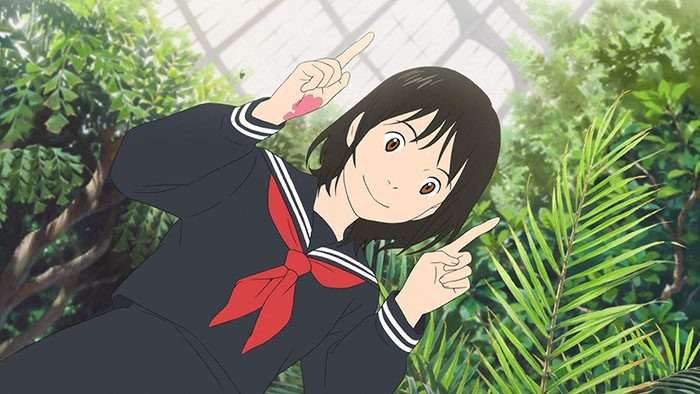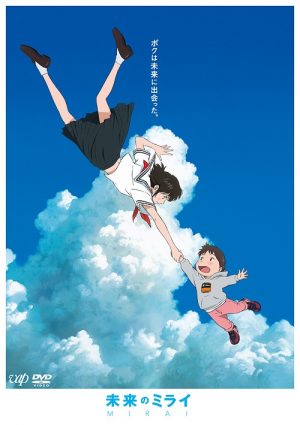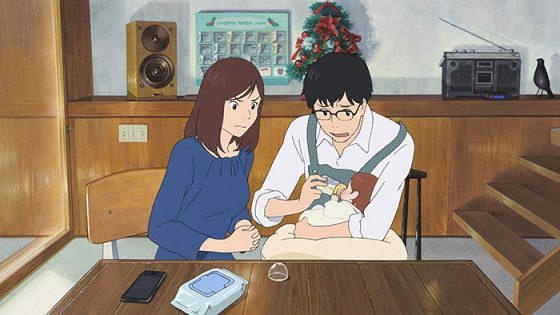
Mamoru Hosoda’s Cross-Generational Feel-good Masterpiece
- Episodes : 1 (film)
- Genre : Adventure, Drama, Comedy, Fantasy
- Airing Date : Jul 20, 2018
- Producers : Studio Chizu
Contains Spoilers
Mirai no Mirai Introduction and Story (No Spoliers)
Mirai no Mirai (meaning Mirai of the Future) follows an energetic, train-obsessed four-year-old named Kun who has just become the big brother to his newborn sister Mirai. Feeling jealous of Mirai for taking more and more of his busy working parents’ already limited attention, and struggling with his own growing pains, Kun is prone to childish fits and tantrums, often storming out into the tiny courtyard the lies within the center of his home, designed by his architect father. Inexplicably, he finds himself transported to fantastic places and times in both the future and the past where he meets many people connected to his family, including the titular teenage Mirai. In each adventure, he learns an important lesson which slowly motivates Kun to mature and better understand others and the world around him.

1. Pure Message
Despite all its whimsical elements, Mirai’s message is quite grounded in reality, its story is as relatable in its portrayal of everyday life as it is astounding in its jumps to fantasy. Family–specifically, connections across generations–is heavily explored through the film in a way that encourages empathy towards others as an inspiration for self-improvement and letting go of self-centered behaviors. While perhaps not a full coming-of-age since Kun is still very much a kid by the end, his growing maturity nevertheless feels triumphant, and this message is one that will resonate with almost anyone.
Another aspect of the film is about the parents adapting to having a second child, especially the father doing his best to take over the household domestic duties while still working from home as his wife returns to her office job after maternity leave. This dynamic, and the other interactions between the parents and their extended family, offers some interesting social commentary that reflects some of the changes happening in contemporary Japan along with being entertaining in their own right, especially to parents.
2. Beautiful Art and Animation
Mamoru Hosoda’s films, starting with The Girl Who Leapt Through Time, have shared a similar and highly appealing character design which has continued in Mirai. Studio Chizu has also kept up quality animation that really brings each movement and expression to life, most noticeable to us was the masterful way the 3DCG elements were used, blending together with the rest of the film nearly seamlessly while allowing for some impressive scenes and very noticeably improved over the studio’s previous film, Bakemono no Ko (The Boy and the Beast). The repeated bird’s-eye view of their home and the cityscape of Yokohama, in particular, was really stunning and will definitely recognizable to anyone who has visited before.
Another highlight for us was the superb editing, especially the many scene transitions that take advantage of the unusual architecture of Kun’s house to great effect. Without being exhaustively gushy about the films high production values, we’ll also mention that the OST was well done, particularly the opening and ending themes by city pop superstar Tatsuro Yamashita, who also provided the music to Hosoda’s Summer Wars.
3. Extra Treats for Hosoda Fans
If you’re a longtime fan of Mamoru Hosoda’s work, Mirai will be even more enjoyable to you thanks to a many callbacks to his previous films. On top of thematic similarities, namely the focus on family, you’ll notice several homages to previous works including the family dog Yukko transforming into a human and even a sequence in which Kun steals his tail and runs around in a part human-part dog form very reminiscent of Ookami Kodomo no Ame to Yuki (Wolf Children) along with some more subtle references like the visualization of the family tree which feels quite OZ-like in design, calling back to Summer Wars.
1. Kun is Obnoxious
In a film without an antagonist, the closest thing we get also happens to be our protagonist Kun whose frequent outbursts often display the ugly side of selfishness exhibited by many kids at his age. While this touch of realism does serve a purpose as Kun eventually shows some signs of maturation by the end, if you’re someone who gets really put off by young child protagonists that can be whiny and relapse into bad behaviors Mirai might not be the anime for you.
2. Low in Stakes, Light on Action
Without an antagonist beyond the sometimes bratty behavior of a child, Mirai never really has much at stake for the viewer beyond wanting to see Kun clean up his act. While technically there’s one fairly tense moment towards the end, we don’t expect most viewers to feel much real suspense, and similarly, there’s not a lot of action or fighting. Basically, if you’re looking for big battles and choreographed fight sequences, look elsewhere!
Final Thoughts

At its core, Mirai is a wholesome coming-of-age tale focused on the themes of personal growth and family told through the lens of fantasy mixed within a mostly realistic spotlight into Japanese life across several generations. It has high production values and a great message that can resonate with almost anyone. If you’re looking for a positive and touching anime that you can watch with your family, we think Mirai is a good bet, especially if you’ve enjoyed Mamaru Hosoda’s other works.
As always, we hope you enjoyed this article! Do you think Mirai was snubbed for the Best Animated Feature Oscar? Let us know your thoughts in the comments below and be sure to stick around Honey’s for more of all things awesome, anime and otherwise!

